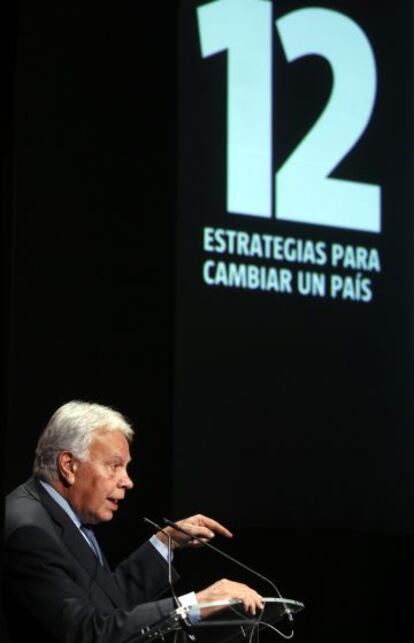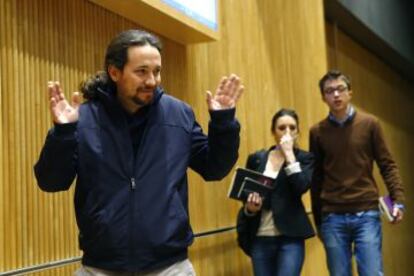Don’t stand in way of Socialist deal, ex-PM tells Mariano Rajoy
“New elections will lead to the same situation,” says statesman Felipe González

With two weeks to go before deputies meet to vote on the investiture of the next prime minister of Spain, Socialist leader Pedro Sánchez has yet to secure a strong enough alliance to ensure that his bid will be successful.
If he fails in his attempt to form a government, as he was tasked to do following the general election of December 20, Spain will be forced to hold fresh elections this year.
But even that would yield a similar situation of political fragmentation, warn the experts.
“If there are new elections, we will go through the same situation we are experiencing now,” said former Spanish leader Felipe González on Wednesday.
González, a Socialist like Sánchez, also sent out a message to Popular Party (PP) leader Mariano Rajoy, who formally won the election with 123 seats but fell short of a congressional majority and has been unable to muster enough backing for a reinstatement bid.
The man who governed the country between 1982 and 1996 also issued a warning against the anti-austerity party Podemos, although he did not mention it by name
Rajoy should not place obstacles in Sánchez’s way if the latter finally manages to close a deal with other parties and form a government, said González at a Madrid conference about the future of Spain.
The man who governed the country between 1982 and 1996 and oversaw milestones such as Spain’s membership in the European Economic Community and NATO, also issued a warning against the anti-austerity party Podemos, although he did not mention it by name.
“Left-wing populism wants to replace representative democracy with direct democracy. It encourages regressive utopias. It has the same basis as [French far-right leader] Marine Le Pen,” said González.
Across-the-board condemnation
Podemos, which is trying to convince the Socialists to create a joint coalition government, scandalized politicians and legal experts this week with a working document that proposed assigning key positions in the judiciary based not just on merit, but also on “their commitment to the government’s program.”
These positions would include the Attorney General, the justices who sit on the Constitutional Court, and the members of the oversight body, the General Council of the Judiciary (CGPJ).

This is the first time that loyalty to the government is expressly stated as a requirement for appointing top legal positions, and legal associations of all kinds have called it an attack against their independence.
“This is one of the greatest aberrations I have heard in recent times,” said Emilio Frías, spokesman for the conservative prosecutor association Asociación de Fiscales.
The Socialist spokesman in the Senate, Óscar López, said on Wednesday that Podemos is proposing “a democratic involution” because of its “obsession” with taking “control” of the secret services (Podemos leader Pablo Iglesias has stated his desire to oversee the National Intelligence Center), the police, the judges, the prosecutors and the public broadcaster.
López also criticized Iglesias for telling the Socialist leader to stop being “arrogant.”
“Pablo Iglesias and humbleness are an oxymoron,” said López. Iglesias has stated that in this joint coalition government, he wants to be the deputy prime minister.
The Ciudadanos connection
Meanwhile, the Socialists are deep in talks with the other emerging party to perform well at the election, Ciudadanos, in a bid to secure its support on March 2 and 3.
But so far the pro-market party, which has 40 seats in Congress, is promising no more than an abstention at the investiture session, which would not be enough for a congressional majority and require support from third parties.
Ciudadanos also says it will not join any government led by either the PP or the Socialist Party, but remain in the opposition.
“We are working toward a complete agreement, which we still don’t have,” said party spokesman José Manuel Villegas. “The party line is that we will either vote against [Pedro Sánchez] or we will abstain.”
Both parties already agree on several major issues, such as lifting parliamentary immunity for deputies under official investigation for corruption, and keeping such individuals off election lists. They also want to encode housing, electricity, water supply and healthcare into the Constitution, as fundamental rights that every citizen is entitled to.
But there are still sticking points over tax and labor reform, and over Ciudadanos’ desire to eliminate provincial authorities in order to streamline government.
English version by Susana Urra.
Tu suscripción se está usando en otro dispositivo
¿Quieres añadir otro usuario a tu suscripción?
Si continúas leyendo en este dispositivo, no se podrá leer en el otro.
FlechaTu suscripción se está usando en otro dispositivo y solo puedes acceder a EL PAÍS desde un dispositivo a la vez.
Si quieres compartir tu cuenta, cambia tu suscripción a la modalidad Premium, así podrás añadir otro usuario. Cada uno accederá con su propia cuenta de email, lo que os permitirá personalizar vuestra experiencia en EL PAÍS.
¿Tienes una suscripción de empresa? Accede aquí para contratar más cuentas.
En el caso de no saber quién está usando tu cuenta, te recomendamos cambiar tu contraseña aquí.
Si decides continuar compartiendo tu cuenta, este mensaje se mostrará en tu dispositivo y en el de la otra persona que está usando tu cuenta de forma indefinida, afectando a tu experiencia de lectura. Puedes consultar aquí los términos y condiciones de la suscripción digital.








































